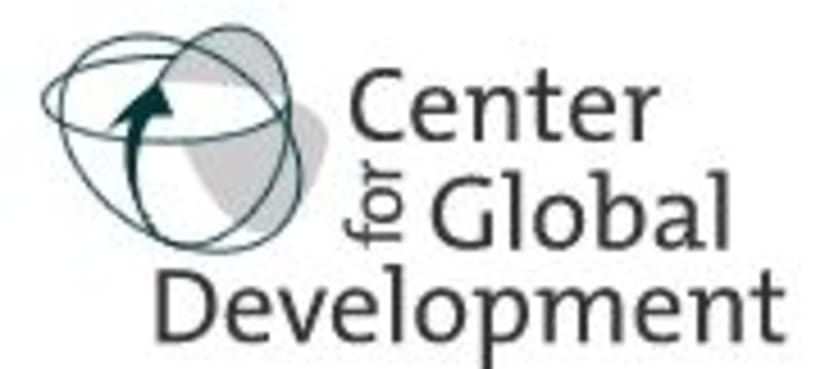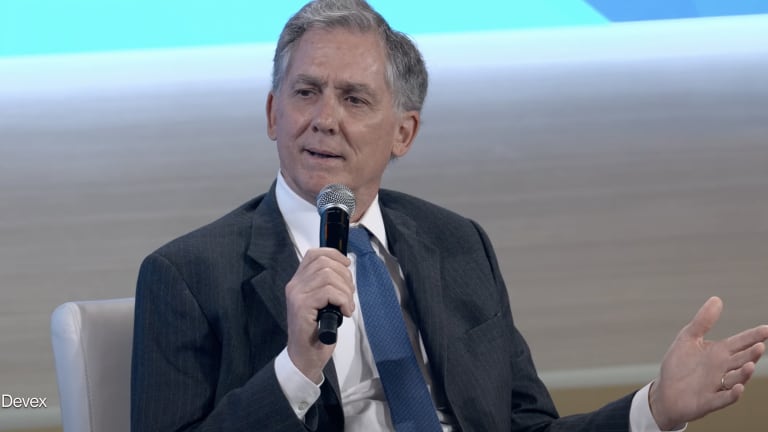
EDITOR’S NOTE: Development issues took spotlight at the World Economic Forum in Davos, according to Nancy Birdsall, president of the Center for Global Development. Some of the discussion focus on climate change, food security and the Millennium Development Goals.
Financial regulation – what to do about the banks – dominated the headlines from Davos. But this year development issues were also prominent in one form or another.
First, climate change. A cloud analysis of topics of the day at Davos would include in big prominent letters Copenhagen/Climate. I sat in on:
A distinguished panel “From Copenhagen to Mexico: What Next?” including Congressman Markey (of the Waxman-Markey House bill), President Calderon, who will host the first post-Copenhagen international meeting of climate negotiators, and Shyman Saran (India’s special envoy on climate), managed a positive spin (but see this take). But as happens when panel members are distinguished and many hold official positions, they skirted one big issue and completely ignored a second one. Both have to do with the troubling differences between developed and developing country positions (and mindsets). The absence of these two issues reflects the primitive state of the dialogue and bodes ill for the 2010 Mexico conference.
First, will there ever be a functioning carbon market? Of those on the panel, only Caio Koch-Weser (and only in his closing remark) mentioned the words “price” and “carbon market” – which in turn requires a price on carbon whether through a tax or cap and trade agreement. Without a market and a price, there is little incentive for technological innovation (Tom Friedman’s ET for energy tech revolution). Without innovation to break the link between energy use and emissions, polluters balk at emissions targets – and India and China resist any commitments that would compromise development. Until that link is severed, reducing emissions implies high costs not only to powerful industries (coal, transportation) in rich countries but also to millions of poor people in developing countries who now suffer “energy poverty” (and more on that below). Markey’s U.S. legislation assumes potential for plenty of trading (especially American power companies and other high-emission companies buying offsets by paying for forest protection and reforestation in developing countries). And as Koch-Weser said (in the spirit of optimism about availability of money for developing countries to work on reducing emissions), the trades are expected to involve more than $30 billion a year in financial transfers to developing countries. But meanwhile many developing countries resist ferociously the idea of allowing any polluters in the rich world “off the hook” via trading (go here for detail), and most climate experts surveyed in rich and poor countries would put serious limits on the use of offsets.
Second, technology transfer. Nothing was said. But for developing countries this is the heart and soul of the matter. President Calderon mentioned the Mexico Green Fund – but without time to clarify that it would be a mechanism for technology transfer not just for revenue raising and transfers. And there was no Chinese participant on the panel to call for joint technology research and deployment.
Another panel, “Trade and Climate Change” was equally discouraging on the primitive state of the discussion. The Indian Minister of Commerce and Industry, Anand Sharma, was an adamant “developmentista”; while protesting that he didn’t want to play the blame game, he rebuffed all questions with statements about the rich countries’ responsibility for the current problem and the implications (justified but poorly argued) for technology transfer and financial compensation. Achim Steiner of UNEP, Pascal Lamy of the WTO, and the Egyptian Minister of Trade and Industry, Rachid M. Rachid, were constructive and reasonable – but their comments had the Doha droop quality – being right on the issue but hopeless on the political likelihood . The Q &A with participants reinforced my concern that progress on any international agreement is still confounded by lack of agreement on what next – even among the technocrats.
Food security. With Bill Gates and Ellen Kullman of Dupont came an unusually open and useful discussion of the GMO issue. In 2001 the UNDP Human Development Report said that it makes no sense to reject GMOs (genetically modified organisms) out of hand. Drought- and pest-resistant crops could bring big gains to small farmers in poor countries – in productivity and in protection of their health. Paul Collier devotes an entire chapter to the misplaced romanticism of the anti-GMO movement in his forthcoming book, The Plundered Planet. Yet the subject is still sensitive – because of European trade rules, continuing nervousness about corporate predation (those one-time seeds), and environmental safety in countries with limited regulatory capacity.
Girl effect. Maria Eitel of Nike Foundation, with input like Ruth Levine’s Start with A Girl “produced” as she did last year the equivalent of a standing-room-only event (though when seats were filled they closed the session), with almost half the participants male and featuring among others Nicholas Kristof, Congresswoman Carolyn Maloney (D-NY), Fazle Abed of BRAC, and with closing remarks I regrettably had to miss from Melinda French Gates. One of the best insights: energy poverty in developing countries hurts girls – lack of electricity keeps them off the streets and at home, where they cannot do schoolwork. (For the implications of energy poverty and lack of energy equity in the world for the climate change discussion, go here).
Global governance “redesign” (the latter the Davos ambition this year). Despite the valiant efforts of Fareed Zakaria to provoke panelists including President Calderon of Mexico, President Zuma of South Africa, and the Prime Ministers of Spain, Korea and Vietnam, the bottom line on three issues he raised (climate, financial services regulation, trade/Doha) was: yes collective action at the global level is clearly desirable but… When? How? Not really clear. The lesson: Panels with only heads of state are not going to be path-breaking.
MDGs. Lord Malloch-Brown moderated a panel including Jeff Sachs, Bill Gates and Prime Minister Morgan Tsvangirai. Sachs called for a new window at the Global Fund to Fight AIDs, TB and Malaria to address safe childbearing – for decades (I remember a 1986 or so initiative at the World Bank on Safe Motherhood – how many women have died in childbirth since then?) as a matter of “basic organization and basic funding”. Bill Gates said that at the Foundation they support a ranking of pharmaceutical industry firms on their contribution to better access to medicines. PM Tsvangirai worried about absorptive capacity of all the money Sachs and others want on the table. Lord Malloch-Brown asserted in closing that “we have punctured the myth that the MDGs are not working”. I am not sure all his panel members actually agreed….
Recapitalization of the MDBs (multilateral development banks). Congressman Barney Frank said the bloated and unnecessary military spending threatens his ability to get these through the Congress.
Re-published with permission by the Center for Global Development. Visit the original article.






